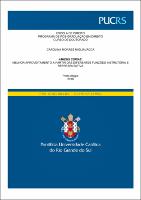| Share record |


|
Please use this identifier to cite or link to this item:
https://tede2.pucrs.br/tede2/handle/tede/9070| Document type: | Tese |
| Title: | Amicus curiae : melhor aproveitamento a partir das diferentes funções instrutória e representativa |
| Author: | Migliavacca, Carolina Moraes  |
| Advisor: | Jobim, Marco Félix |
| Abstract (native): | Este trabalho versa sobre a aplicação do amicus curiae no Direito Processual Civil brasileiro após a edição do Código de Processo Civil de 2015. Tal legislação incluiu o instituto como forma de intervenção de terceiros, trazendo alguns parâmetros para sua utilização em primeiro e segundo grau de jurisdição. Para acrescentar maior efetividade e utilidade ao instituto, sugere-se, na presente tese, critérios e tratamentos processuais adequados a cada uma das principais funções exercidas pelo amicus curiae: a função instrutória e a função representativa. Com este propósito, examinam-se os principais aspectos do texto legislativo encontrado no artigo 138, CPC, separando-se quais requisitos estariam mais vinculados à função instrutória ou à função representativa. Após, foca-se especificamente nos critérios e tratamentos processuais de cada função. Quanto ao amicus curiae na função instrutória, utiliza-se o estudo do Direito Comparado na experiência estadunidense como ponto de comparação, com o propósito de examinar as críticas desenvolvidas no sistema paradigma, a fim de contornar os mesmos empecilhos na prática brasileira. Quanto ao amicus curiae representativo, volta-se ao fundamento da participação democrática na atividade jurisdicional para a sugestão de critérios e alicerces na sua aplicação, sempre a partir das balizas do artigo 138, CPC. |
| Abstract (english): | This work deals with the application of amicus curiae in Brazilian Civil Procedural Law after the 2015 Civil Procedure Code. Such legislation included the institute as a form of third parties intervention, bringing some parameters for its use in the first and second degree of jurisdiction. To add greater effectiveness and usefulness to the institute, the present thesis proposes appropriate criteria and procedural treatments for each of the main functions performed by the amicus curiae: the instructive function and the representative function. For this purpose, the main aspects of the legislative text found in article 138, CPC, are xamined, separating which requirements would be more linked to the instructive function or the representative function. Afterwards, it focuses specifically on the criteria and procedural treatments of each function. As for the amicus curiae in the instructive function, the study of Comparative Law in the US experience is used as a point of comparison, with the purpose of examining the criticisms developed in the paradigm system, in order to circumvent the same obstacles in Brazilian practice. As for the representative amicus curiae, the idea of democratic participation in judicial activity is turned to for the suggestion of criteria and foundations in its application, always based on the guidelines of article 138, CPC. |
| Keywords: | Amicus Curiae Intervenção de Terceiros Participação Democrática Common Law Amicus Curiae Third Party Intervention Democratic Participation Common Law |
| CNPQ Knowledge Areas: | CIENCIAS SOCIAIS APLICADAS::DIREITO |
| Language: | por |
| Country: | Brasil |
| Publisher: | Pontifícia Universidade Católica do Rio Grande do Sul |
| Institution Acronym: | PUCRS |
| Department: | Escola de Direito |
| Program: | Programa de Pós-Graduação em Direito |
| Access type: | Acesso Aberto |
| Fulltext access restriction: | Trabalho será publicado como artigo ou livro |
| Time to release fulltext: | 18 meses |
| Date to release fulltext: | 06/07/2021 |
| URI: | http://tede2.pucrs.br/tede2/handle/tede/9070 |
| Issue Date: | 26-Nov-2019 |
| Appears in Collections: | Programa de Pós-Graduação em Direito |
Files in This Item:
| File | Description | Size | Format | |
|---|---|---|---|---|
| TES_CAROLINA_MORAES_MIGLIAVACCA_COMPLETA.pdf | CAROLINA_MORAES_MIGLIAVACCA_TES | 3.02 MB | Adobe PDF |  Download/Open Preview |
Items in DSpace are protected by copyright, with all rights reserved, unless otherwise indicated.




